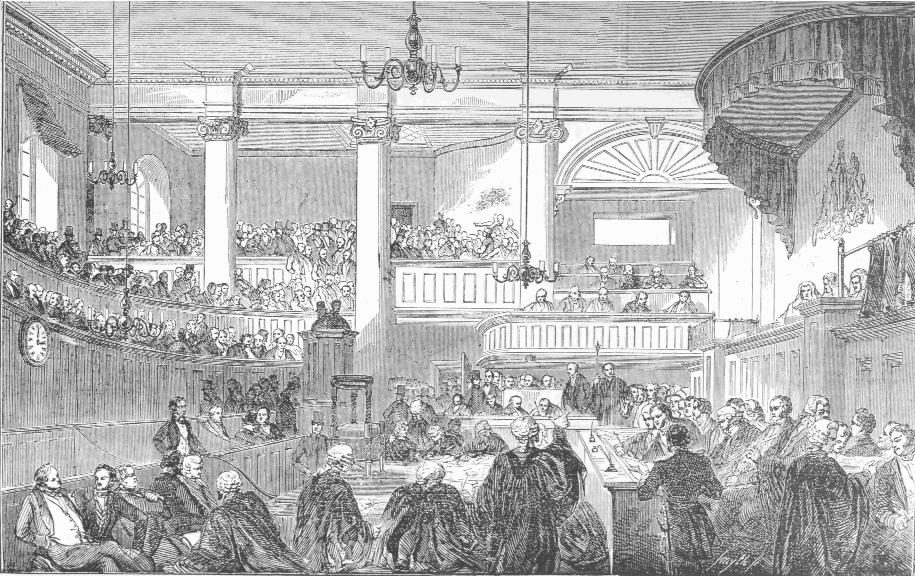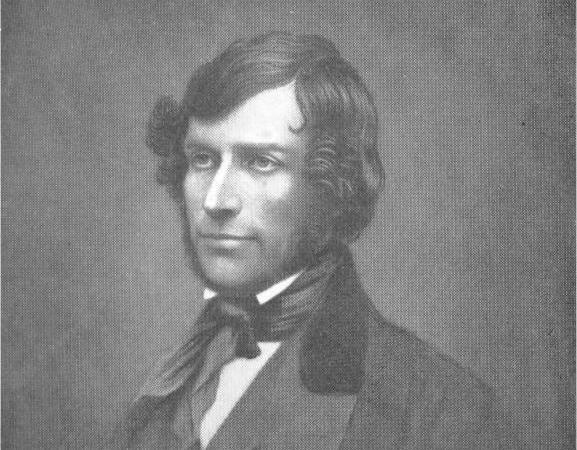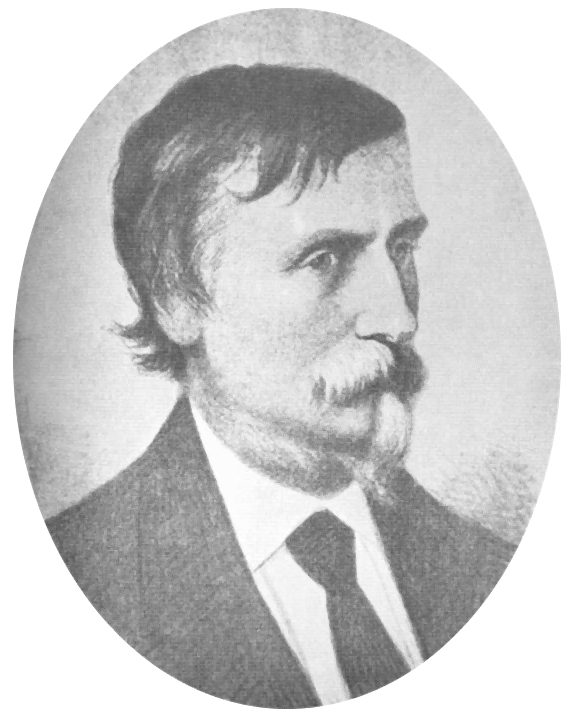John Mitchel was born near Dungiven, County Derry in 1815. He became a leading member of both the ‘Young Irelander’ and the ‘Irish Confederation’ movements. He was a solicitor, an Irish nationalist activist and a political journalist. He was an outspoken critic of British rule in Ireland, in particular the government’s lack of reaction to the Irish famine. Ireland simmered and was angry and ready for rebellion in the 1840’s and Britain was fearful that the rousing Mitchel could be the spark to light a revolutionary fire. London’s Punch magazine emphasised his international standing by portraying him as an Irish monkey, challenging the Great British Lion. While the Times thundered against him which only seved to raise his profile further. When Mitchel produced his own republican newspaper, the United Irishman, it sold out immediately and readers hung on every word. In order to silence Mitchel, to rob him of his heroic status and his possible martyrdom, the British government passed the 1848 Treason Felony Act, which sought to treat treason as a common crime. Mitchel was arrested and tried.
 In 1848 he was the first person to be convicted of sedition under the ‘Treason Felony Act’, a sentence created with him in mind. He was sentenced to fourteen years transportation and at the time Bermuda in the Caribbean was one of the main destinations. Following his conviction in Dublin on the 27th of May 1848, Mitchel was transferred under military escort to Spike Island on H.M.S Scourge, where he was incarcerated for three days, and on to Bermuda and eventually Australia in 1850. During his journey, he began to write his famous ‘Jail Journal; or ‘Five Years in British Prisons’, his diary of his experiences from Dublin and on Spike Island until his arrival in New York on the 29th of November 1853.
In 1848 he was the first person to be convicted of sedition under the ‘Treason Felony Act’, a sentence created with him in mind. He was sentenced to fourteen years transportation and at the time Bermuda in the Caribbean was one of the main destinations. Following his conviction in Dublin on the 27th of May 1848, Mitchel was transferred under military escort to Spike Island on H.M.S Scourge, where he was incarcerated for three days, and on to Bermuda and eventually Australia in 1850. During his journey, he began to write his famous ‘Jail Journal; or ‘Five Years in British Prisons’, his diary of his experiences from Dublin and on Spike Island until his arrival in New York on the 29th of November 1853.
 His journal was first published in book form in New York in 1854. The book was highly influential at the time as many readers were shocked to hear of the ‘dark age’ conditions in which some prisoners were still being held on Spike Island, despite some efforts at reform in other prisons within the Victorian penal system. There was a loud call for reform which started right here on Spike Island and would be exported to the world, called the ‘Spike Island system’. But the books biggest impact came in its contribution to the cause of Irish nationlism. The style of Mitchel’s prose was well received by the influential higher classes and it prompted many to reconsider their stance on the impact of Empire and the just cause of national sovereignty and freedom. The Jail Journal has been described by the Oxford Dictionary of Biography as one of the ‘classics of Irish revolutionary writing’ and by others as ‘the manual of Irish nationalist philosophy’. Though it was many decades later that Ireland finallly won its freedom, several members of the 1916 generation cited Mitchel as their inspiration.
His journal was first published in book form in New York in 1854. The book was highly influential at the time as many readers were shocked to hear of the ‘dark age’ conditions in which some prisoners were still being held on Spike Island, despite some efforts at reform in other prisons within the Victorian penal system. There was a loud call for reform which started right here on Spike Island and would be exported to the world, called the ‘Spike Island system’. But the books biggest impact came in its contribution to the cause of Irish nationlism. The style of Mitchel’s prose was well received by the influential higher classes and it prompted many to reconsider their stance on the impact of Empire and the just cause of national sovereignty and freedom. The Jail Journal has been described by the Oxford Dictionary of Biography as one of the ‘classics of Irish revolutionary writing’ and by others as ‘the manual of Irish nationalist philosophy’. Though it was many decades later that Ireland finallly won its freedom, several members of the 1916 generation cited Mitchel as their inspiration.
Patrick Pearse declared the Jail Journal to be ‘the last of the four gospels of the new testament of Irish nationality, the last and the fieriest and the most sublime’. Eamon De Valera revered Mitchel and in 1943 when he imagined Ireland as ‘the home of a people who valued mat-erial wealth only as a basis for right living, of a people who, satisfied with frugal comfort, devoted their leisure to the things of the spirit’, he too was delving into Mitchel’s Jail Journal for his inspiration.
Mitchel returned to Ireland for the first time on the 17th February 1875 to contest the Tipperary by election to become a Member of Parliament in the British House of Commons. He won the election however he was not allowed take his seat as he was a convicted felon. The election was rerun on the 12th March and he won again by an even greater majority, yet he was deprived of his seat.
He died on the 20th March 1875 in Newry at the age of sixty. The fort on Spike Island was renamed from Fort Westmoreland to Fort Mitchel in his honour in 1951, and some GAA clubs In Ireland and sites in America bear his name.
 It has righly been pointed out by modern historians that Mitchel besmirched his name by being an adovcate of the slave trade in America’s sourthern states. He supported the Confederates in the American civil war, and two of his sons died fighting against the union. His support was at odds with his ardent belief in the right of Irish people to assert their freedoms, and shows the often complicated status of historical figures. While abhorring his support of the confederate states and the act of slavery, his contribution to the cause of eventual Irish freedom is well established.
It has righly been pointed out by modern historians that Mitchel besmirched his name by being an adovcate of the slave trade in America’s sourthern states. He supported the Confederates in the American civil war, and two of his sons died fighting against the union. His support was at odds with his ardent belief in the right of Irish people to assert their freedoms, and shows the often complicated status of historical figures. While abhorring his support of the confederate states and the act of slavery, his contribution to the cause of eventual Irish freedom is well established.
The copy you will see of john Mitchels diary on display in the John Mitchel room on Spike Island is a rare first edition of ‘Jail Journal’, while a commisioned video tells the story of his fascinating life.
